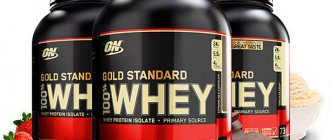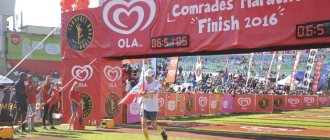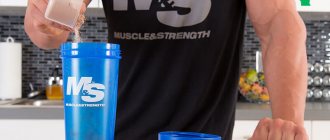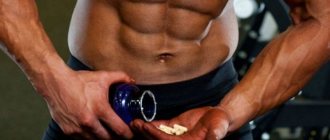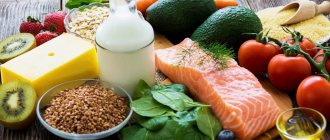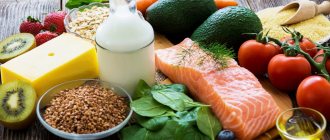Sports supplements are an important component of physical training.
Thanks to them, classes become more productive, the body recovers faster, and the athlete does not feel discomfort. The basis of sports nutrition is natural ingredients. And the dose of nutrients in the mixtures is selected so as to increase the body’s performance and replenish the energy expended after training. Supplements protect the athlete from exhaustion and weakened immunity; the main thing is to choose and use them correctly.
There are many myths and misconceptions about sports nutrition. For example, about the negative impact on the athlete’s potency. However, natural supplements such as peanut butter or amino acids may not have any effect on sexual health. Let's look at the pros and cons of taking protein shakes, fat burners and other sports nutrition, why it is necessary and whether it is necessary, how and when to drink it correctly.
What is it and what is it for?
Sports nutrition is a supplement based on nutrient concentrates that are made from natural and chemical raw materials. The mixtures saturate the athlete’s body with useful substances that are necessary for energy, endurance, accelerated muscle growth, and weight loss.
Important! It should be remembered that sports nutrition alone will not help achieve high results. A comprehensive approach is needed: regular training, rest, proper nutrition and nutritional supplements.
In a broad sense, the correct regime and organization of an athlete’s diet
An athlete's diet should contain a large amount of proteins and carbohydrates.
Proteins accelerate the growth of muscle tissue, compensate for the loss of nitrogenous substances, and tone the central nervous system.
Thanks to carbohydrates, the body receives more energy, which is needed during long workouts.
Important! The ratio of nutrients in an athlete’s daily diet: carbohydrates - from 9 to 13 g, proteins - from 2 to 2.5 g, fats - from 1.6 to 2.3 g per kg of weight.
In the narrow sense - sports nutrition
Athletes need a lot of calories. They can get them from sports nutrition. They are easily digestible, saturate the body with useful substances, and do not overload the digestive organs.
The main thing is to choose the right type of supplements in accordance with your goals. For example, whey protein is used for muscle growth, fat burners are used for weight loss and fitness, and creatine is used for strength and endurance.
Important! To experience only the positive effects of sports nutrition, you need to follow the dosage and regimen of taking ready-made mixtures and correctly prepare the supplements yourself.
Be sure to check out:
Side effects of creatine on the body Sports nutrition for women is the best way to build a beautiful and healthy body The benefits and harms of sports nutrition: recommendations for use and contraindications Rules and features of sports nutrition after training
Everything you need to know about Andarine Sarms
The drug was developed by the American company GTX.INC for the prevention of muscle atrophy and osteoporosis. The most famous laboratory cipher is S-4. Although during the development process the drug was called GTx-007 (according to the company designation).
It also has a Latin term - Andarine, which, in turn, is used most often. Today, the company has stopped producing the drug in favor of an analogue, ostarine. At the same time, drugs based on Andarine (Andarine, S-4) are actively produced by other brands, for example, Andarine from Envenom Pharm.
Pros and cons of taking sports nutrition, effects on the body
Sports supplements have their advantages and disadvantages. The main advantage is that the mixtures allow you to correct your figure, increase muscle mass, and get rid of extra pounds in a short time.
Nutrient concentrates are obtained after processing natural components. Simply put, it is ordinary food from which all components that are not beneficial have been removed.
However, sports mixtures may contain chemicals that often provoke allergies and other adverse reactions.
What is the benefit
The beneficial properties of supplements have been proven by many professional athletes:
- Mixtures increase endurance and strength.
- Accelerate muscle growth.
- Promotes fat burning.
- Accelerate the recovery of the body.
- Saturate the body with useful substances.
In addition, sports nutrition speeds up metabolism, cleanses the body of harmful substances, and strengthens the immune system.
Harm, contraindications and side effects for men and women
Sports nutrition can only be harmful if it is individually intolerant or used incorrectly. The risk of negative reactions increases if an athlete has purchased low-quality supplements.
The following side effects may occur after consuming sports mixtures:
- Nausea.
- Heartburn.
- Flatulence.
- Diarrhea.
- Allergy.
Important! If such negative reactions occur, you should stop taking the supplement and consult a doctor.
Content:
- Andarine is a drug from the SARMs group.
- Everything you need to know about Andarin (Sarms).
- Properties of the additive.
- How to take Andarine (S-4)
- Precautionary measures.
- Scientific research
- Where to buy the drug?
- Conclusions.
Andarine is part of a group of drugs that, when following a hypocaloric diet, promote muscle gain, simultaneously with the launch of the fat burning process (have an anabolic and androgenic effect on the body). A course of taking the drug, in combination with strength training, will give the body the necessary impetus to overcome the plateau of stagnation.
Initially, the drug was developed specifically for the treatment of muscle atrophy, osteoporosis, and other diseases associated with the musculoskeletal system. However, soon it was noticed that the active component has a supporting effect on the muscle tone of the body and helps to increase the size of muscle mass, while almost not retaining water in the body. These beneficial properties of the S-4 compound quickly found application in strength sports, in particular in weightlifting.
How to properly prepare and consume when playing sports
Regardless of the type, mixtures must be taken within a strictly limited time. Classes will be effective only if the athlete knows how and in what dosage to use the drug.
Sports nutrition will bring maximum benefits if it is prepared correctly. Supplements can be diluted in water, juice, milk or kefir with a low fat content. To find out how to prepare the drink, you need to study the instructions. It is recommended to consume the drink immediately after preparation.
Recommendations
To experience the positive effects of the supplement, you need to consider the following recommendations:
- In the morning, it is recommended to take whey protein with amino acids.
- It is better to replace morning coffee with caffeine tablets.
- During breakfast you need to take a vitamin-mineral complex.
- An hour before class, take pre-workout supplements or nitric oxide.
- Half an hour before training, consume whey protein.
- Immediately after exercise, drink whey protein, amino acids, creatine, beta-alanine, carbohydrates.
Before going to bed, you need to take casein and fish oil.
Reception scheme
To improve your training results, take sports nutrition according to the following regimen:
- After waking up - 20 g whey protein, 5 g leucine or BCAA, 200 mg caffeine (if you need energy).
- An hour later during breakfast - 1 dose of multivitamins.
- 1-1.5 hours after breakfast - from 500 to 1000 mg of fish oil.
- At lunch - from 2 to 3 g of fish oil.
- An hour before the first workout - 500 to 1000 mg of green tea extract.
- Half an hour before class 2 - 20 g of protein, 5 g of BCAA, about 5 g of creatine, 3 g of beta-alanine.
- 45 minutes after training - 20 g whey protein, 15 g casein, 5 g BCAA, 4 g creatine, 2.5 g beta-alanine, 45 g fast carbohydrates.
- During dinner – 1 g of vitamin C, 450 mg of calcium, 1000-3000 IU of vitamin D.
- Half an hour before bedtime - 20 g of casein, 3 g of fish oil.
By following this regimen, you will notice results very quickly.
Read on for a comprehensive guide to sports nutrition for beginner athletes.
Protein
A type of sports nutrition consisting of concentrated protein. Protein is used to build muscle tissue, bones, hormones and enzymes. In other words, during systematic exercise with weights, you need to consume protein to build lean muscle mass, although, as we have already found out, this is not its only function.
There are many myths surrounding this supplement. One of them says that protein is chemistry. In fact, protein is made from natural products that are subjected to purification processes. Another myth talks about the harmful effects of the product on internal organs. In reality, for such effects to appear, you need to take a huge amount of protein per day, about 350 grams or more, which in practice is simply not possible. It is also a myth that protein is addictive. In fact, any tasty food is addictive. That's why you want to eat it again and again. And finally, another popular myth, according to which sports nutrition, in particular protein, is “not worth it.” In practice, everything happens quite the opposite. Protein-rich foods have the best effect on reproductive function. In our article “Proper Nutrition for Sports,” in the list of protein foods, you will find seafood, which includes, among others, squid and shrimp. They are known to be considered one of the best aphrodisiacs - substances that stimulate and enhance sexual desire. So, we have debunked several myths that float around protein and have no basis in fact. Now that we know that protein is not at all harmful, but is very useful and necessary, we can move on to studying its varieties.
- Whey protein comes first in terms of effectiveness. It is produced from whey, is absorbed quite quickly and has high biological value.
- Egg protein is in second place after whey protein in its effectiveness, it also has decent biovalue and is absorbed by the body within 4-6 hours.
- Casein protein is characterized by the fact that its biovalue is 80%. At the same time, the rate of its absorption is minimal, so most often it is taken at night.
- Soy protein, among other things, can reduce cholesterol levels in the blood. However, its disadvantage is considered to be the mediocre quality of purification and low absorption.
- Complex protein includes all the types of protein listed above. It combines all their advantages, so it is rightfully considered both useful and effective.
You most likely have a logical question - “so which one is better?” There is no better or worse, they are all equally good, it’s just that each one is produced and used for different purposes. Two questions remain open regarding this supplement. So, is sports nutrition harmful, and what side effects can be caused by its use? Let's look at these questions in order.
So, regarding the harm. Is he there or not? Can protein be consumed by children, adults and the elderly? The answer goes like this. Protein is made from natural raw materials, which are of natural origin, which means there are no restrictions on gender or age. Moreover, this protein powder is the basis of infant formulas such as “Baby”, which we all used in childhood.
The only side effect in the use of this product is “individual intolerance,” which is caused not by the production, quality or origin of the product, but by the individual physiological characteristics of the human body. By the way, individual intolerance can also be expressed in relation to ordinary food products. This problem is expressed in the form of digestive disorders, flatulence, diarrhea, abdominal pain, and, less commonly, constipation. The disease is treated by adjusting the diet and reducing the dosage of protein portions.
Well, we have looked at protein sufficiently, learned its pros, cons, benefits, varieties and talked about the myths circulating around it. This type of sports nutrition is suitable for both gaining weight, losing weight, and maintaining it, which indicates its versatility.
How much does it cost
The price of sports nutrition depends on the type of product, volume and manufacturer:
- For amino acids (500 g) you will have to pay 900-1,600 rubles.
- The price of proteins (500 g) is from 600 to 1,200 rubles.
- The average cost of gainers (1000 g) is 800 rubles.
- Creatine (500 g) costs about 800 rubles.
- Isotonic drinks (500 g) cost from 700 to 850 rubles.
- The average cost of pre-workout supplements (600 g) is 1,500 rubles.
- The price of fat burners ranges from 700 to 1,800 rubles.
- Vitamin and mineral complexes can be bought for 500-1,800 rubles.
Prices in different regions of Russia differ.
Important! Before purchasing a sports supplement, study the composition and quality certificates for the products.
Fat burners
Sports supplements or various drugs designed to reduce the percentage of subcutaneous fat, reduce weight and show body contour. The principle of their action is often based on stimulating metabolic processes, suppressing appetite, blocking the synthesis of adipose tissue and more. The effect of such drugs is closely related to the training process and proper nutrition. Thus, for those who want to lose weight, but do not exercise and eat everything, the drug will not bring any benefit, and the effect of its use will be minimal. Below are the main types of sports supplements aimed at reducing the level of subcutaneous fat and highlighting the relief:
- Thermogenics. Supplements whose main principle of action is to increase the body’s production of heat, which leads to a noticeable acceleration of fat burning.
- Carbohydrate blockers. Their operating principle is based on blocking enzymes that break down carbohydrates, which is why the body receives fewer calories from food.
- Fat blockers. Their operating principle is based on blocking enzymes that break down fats, increasing viscosity and reducing the absorption of gastric contents.
- Thyroid stimulants. Its hormones increase sensitivity to neurotransmitters, which speeds up metabolism and promotes fat burning.
- Appetite suppressants. The action of this sports supplement is based on the work of mechanisms aimed at suppressing the hunger center and activating the satiety center.
- Cortisol blockers. One of the main effects of cortisol is the accumulation of fatty tissue. The drug reduces its secretion and activity.
- L-carnitine (levocarnitine). The drug transports fatty acids to the mitochondria, where they are destroyed, which gives a fat-burning effect.
- Omega-3 fatty acids. The drug reduces the level of subcutaneous fat by accelerating metabolism, enhancing hormone production and suppressing the release of cortisol.
Now again, about the dangers of sports nutrition. As for the harm or side effects from the use of fat burners, the safety of such drugs usually depends on the composition of the components and their quality. You should avoid using them if you have: arterial hypertension, coronary heart disease, arrhythmias and other heart diseases, diseases of the thyroid gland, gastrointestinal tract, kidney and liver failure. In this case, you must first consult a doctor, otherwise fat burners may cause you to experience increased heart rate, increased blood pressure, trembling, sweating, insomnia, nausea, vomiting, heartburn, diarrhea or flatulence.
Be that as it may, experience shows that following the manufacturer’s recommendations and the absence of objective contraindications make taking fat-burning sports supplements completely safe for health. In any case, it is recommended to consult a doctor before starting use.
Helpful Champion Tips
You can only get valuable recommendations on choosing sports nutrition from professional athletes who have proven their strength at high-level competitions. They have invaluable experience that they share with newcomers. Their advice will help you avoid mistakes and achieve your goals faster.
Opinion of Denis Tsyplenkov
The absolute world champion in arm wrestling advises using gainers rather than proteins to increase muscle mass, since the composition of this supplement is balanced.
Creatine is very beneficial for athletes. D. Tsyplenkov advises using 50 g of the mixture for 2 weeks so that it accumulates in the tissues. Then drink 50 g before training, and 25 g on days without training.
Pre-workouts are best taken half an hour before classes to improve blood flow and increase energy.
Opinion of Vladimir Kravtsov
The European and Russian bench press champion advises immediately creating a training program. After this, you can stock up on protein, creatine, gainer, and amino acids. But it is important to follow the supplement regimen.
Opinion of Mikhail Koklyaev
MSMK for weightlifting offers the following regimen for taking sports nutrition:
- First dose – 50 g of protein, 1 spoon of BCAA. After 40 minutes, have breakfast. Then drink 1 teaspoon of creatine.
- You need to have lunch 2 hours before the training. Before class, take BCAAs, creatine, pre-workout, gainer. After exercise, consume isolate, fast carbohydrates, BCAAs.
Before going to bed, you can take 25 g of casein protein. It is absorbed in about 8 hours, providing an increase in muscle mass.
How to take Andarine (S-4)
To achieve visible results, it is recommended to use the drug in a course of 6 weeks. For the purpose of fat burning, it is optimal to use Andarine in combination with Ostarine. The half-life of the active substance from the body is 4-6 hours.
The table shows the optimal dosage of Andarine for the 25 MG capsule form. The supplement should be taken in the morning, after breakfast (one hour later). People over 85 kg, take 2 capsules per day (one in the morning, the second immediately after training).
Up to 85 kg - 25 mg per day for 6-8 weeks. Combines with Ostarine.
Over 85 kg - 50 mg per day in 2 divided doses for 6-8 weeks.
Maintaining muscle tone - 25 mg 3-5 weeks.
Andarine Sarms is a safe product for effective fat burning, while simultaneously having a moderate anabolic effect on muscle mass.
Useless sports nutrition
Levoton complex
Below, we will show you a list of sports supplements that are currently considered ineffective (compiled by experts in their field):
- Brutalin
- Energy diet
- Herbalife
- Green coffee
- Liquid chestnut
- Myostatin inhibitors
- Leveton
- Osteomed forte
- Tribestan
- Goji berries
- Samyun Wan
- Tayga8
We strongly do not recommend buying them in stores, due to the ineffectiveness of these additives. Buy in stores only what actually works.
Side effects
As we have already understood, most sports supplements do not have them, and those that can cause them are quite easily reversible by reducing the dosage, adjusting the diet, or stopping their use. They can cause harm only if the dosage is significantly exceeded, which the manufacturer does not recommend exceeding, firstly. Secondly, a significant excess of consumption of any food product threatens nothing more than an upset stomach, nausea or vomiting. Thirdly, and most importantly, if you are not deprived of having a head on your shoulders, and everything is in order with your health, you most likely will not exceed the dosages of sports nutrition recommended by the manufacturer, and if undesirable reactions of the body occur, reduce them or stop taking them.
Basic principles
Understanding the basic principles will give a greater effect than buying a magic gainer or another fat-burning supplement.
When purchasing a supplement, you must understand what problems it will help solve.
Power requirements must address the following:
- increasing general and special performance;
- acceleration of recovery, prevention of overstrain of the body after exercise;
- adaptation and normalization of biological rhythms when changing time zones;
- supporting immunity and preventing immunodeficiencies caused by training and competitions;
- body weight management (both in terms of increase and decrease);
- creation of optimal water regime and exchange of essential minerals.
Carbohydrates are a quick source of energy during exercise. At this time, glycogen stores decrease. They must be compensated from food, but at high costs this time can stretch up to 24 hours. With prolonged exercise, the sources of carbohydrates in the body change. First, the muscle reserves are used up, then the liver, and only then the body begins to break down proteins and fats.
During periods of high intensity, you need up to 700 g of carbohydrates per day with a weight of 70 kg in order to replenish reserves on time. The main products should be those that do not cause jumps in glycemia and take a long time to be absorbed. But since it is difficult to get the required amount from food, you can include 7% quickly digestible carbohydrates in the form of drinks, for example with maltodextrin. During the competition, drink 1 glass of 7% solution every 20 minutes. Strengthening carbohydrate reserves intensifies the joint intake with protein, about 5-9% of the carbohydrate content.
Squirrels . With moderate training (several hours a day) with 1-2 days of rest per week, it is recommended to eat up to one and a half grams per kilogram of weight per day. If the load increases beyond 3 hours a day, then the calculation is made based on two grams per kilogram of weight. Some athletes have a problem with a lack of protein in their diet, then the calculation is also made at 2g/kg, often running, boxing, wrestling, swimming, gymnastics, cycling.
The nutritional value and availability of protein is influenced by processing method and product source. Good sources of protein include fish, egg whites, chicken breast, skim milk, whey - all low-fat foods.
Fats can make up ⅓ of the daily diet. During high-intensity loads, their share can be increased to half. It is important to maintain the correct ratio of omega-3, 6 and saturated fatty acids.
During intense exercise, the proportion of fat in the diet can reach 50%.
This is what the International Society of Sports Nutrition draws the attention of athletes .
- It is necessary to calculate a schedule for replenishing energy reserves under loads of moderate and high intensity over a long period of time.
- Take fast-digesting carbohydrates with electrolytes in liquid form at ¼ hour intervals.
- Fast carbohydrates are quickly absorbed, but have a high glycemic index. Fructose can be a source of digestive problems.
- After training, it is recommended to take 0.2 g of protein for better glucose storage in the body.
- Use a protein-carbohydrate mixture (U 6-20 g) + (B 30-40 g) before exercise and for 3 hours after to improve anabolic processes.
- Everyday intake of protein-carbohydrate combinations with loads increases muscle strength, and also increases the percentage of muscle mass, while reducing fat mass.
- Increased effect when using creatine.
- An ambiguous reaction from the digestive system occurs to dairy products.
- The basic principle is that eating the right carbohydrates preserves muscles and increases their endurance. Controlling the fat in your diet helps regulate the rate of carbohydrate absorption during exercise.
- To restore glycogen reserves, the ratio of carbohydrates to proteins should be 3:1.
